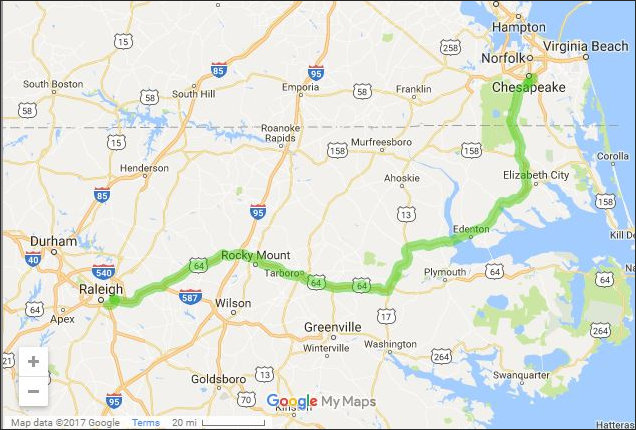
Proposed route of I-87 linking Raleigh and Norfolk.
Sen. Frank Wagner, R-Virginia Beach, is the Republican candidate you’d almost forget was running for governor were it not for the occasional newspaper article like the one in today’s Richmond Times-Dispatch. He doesn’t have Ed Gillespie’s financial resources, and he lacks Corey Stewart’s penchant for controversy. But he’s out there, plugging away. As a long-time legislator, his ideas deserve a hearing.
Some of his ideas make sense. He is a fiscal conservative disinclined to gamble with big spending schemes or tax cuts that could disrupt the state budget. “This is not the federal government,” he said at a recent reception in Mathews County. “We cannot print money. We have to balance budgets day in and day out every day.”
But some of his ideas need work. His proposal for jump-starting the economy is to increase transportation spending. Because he’s a fiscal conservative, he would finance that spending through a tax hike, shifting to a sliding scale in which gasoline taxes are higher when the retail price of gasoline is lower, and taxes are lower when the price of gasoline rises.
In the article, Wagner elaborated on his thinking about transportation as a driver of economic development:
Virginia’s transportation network does not foster economic growth, he said, and the state will fall further behind North Carolina without major improvements. For one, North Carolina is planning a highway to connect Raleigh and the research Triangle to Norfolk and the port.
“That’s what business-people do,” Wagner said. “They make strategic investments and expect a return on that investment.”
Another thing business people do is conduct cost-benefit analyses before they make big investments. If anyone has conducted a reputable cost-benefit analysis of Interstate 87 between Raleigh and Norfolk, you can’t find it on the website of the Triangle’s Regional Transportation Alliance (TRA). (If someone knows of such a study, please let me know.) By way of justification, the RTA offers gassy language about investment that would accrue to North Carolina communities along the route (without acknowledging that communities not on the route might see investment shrink) and make it easier for tourists up north to reach the Raleigh area.
The singular virtue that I can see in I-87 is that half the proposed route is already constructed to Interstate standards. Supposedly, the 213-mile Interstate would cost only $1 billion to build. By eye-balling the map, I’d guesstimate that North Carolina would be responsible for building and maintaining 90% of the length. If North Carolina wants to waste its money, well, what the heck, maybe Virginia should be willing to throw in a few bucks to open up a new route for truck shipments from Virginia ports.
But that’s all back-of-the-envelope thinking. The acid test of whether such a project would be an economic boon or drain is whether it could support itself through tolls. Is there sufficient demand for a Norfolk-to-Raleigh connection — perhaps from trucks emanating from the Port of Virginia — that it could pay its own way? If so, and if private sector concessionaires were willing to put their own money into a public-private partnership, I’d be inclined to support the project. Conversely, if business people look at the project and decline to invest their own funds, then I’d be inclined to think that I-87 is just another boondoggle backed by civic boosters angling for Some One Else’s Money.
If Wagner really wants to do like business people do, perhaps he should get business people to pay for the project — and not raise Virginians’ taxes.


